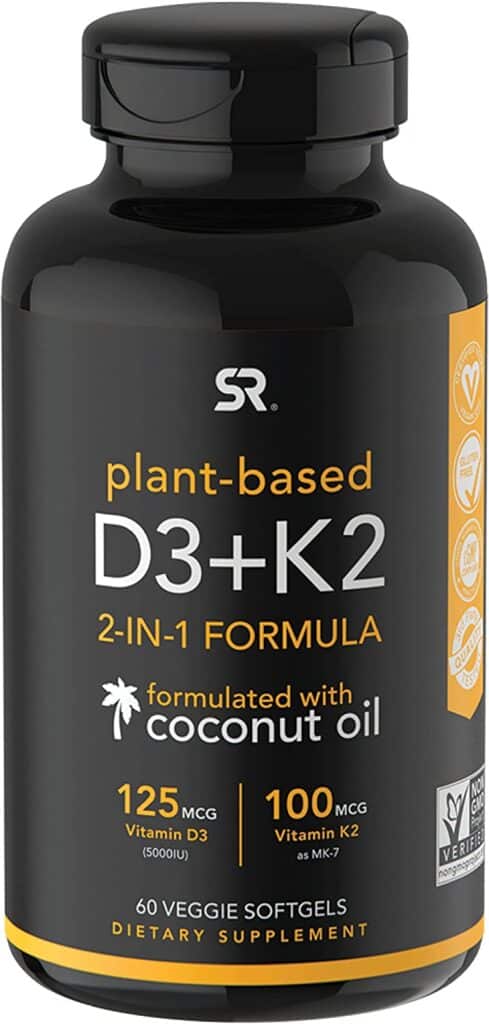Vitamin D, also known as the sunshine vitamin, is a vital nutrient that plays a crucial role in various bodily functions. It is essential for bone health, immune system function, and many other processes in the body. In this article, we will explore the benefits of vitamin D, the recommended daily intake, food sources, and how to ensure you’re getting enough of this essential nutrient.
What is Vitamin D?
Vitamin D is a fat-soluble vitamin that is naturally produced in the skin when exposed to sunlight. The ultraviolet B (UVB) rays from the sun convert a cholesterol compound in the skin to vitamin D3. This process occurs when the sun’s rays are strong enough to cause a slight pinkness or redness to the skin. Vitamin D3 can also be obtained through diet or supplements.
What Are the Benefits?
Strong Bones and Teeth
One of the primary benefits of vitamin D is its role in bone health. Vitamin D helps the body absorb calcium and phosphorus, which are essential for building and maintaining strong bones and teeth. Without enough vitamin D, bones can become thin, brittle, or misshapen, leading to conditions like osteoporosis or rickets.
Improved Immune Function
Vitamin D also plays a vital role in the immune system. It helps regulate the immune response and has been shown to have antimicrobial and anti-inflammatory properties. Low levels of vitamin D have been associated with an increased risk of respiratory infections, autoimmune diseases, and some types of cancer.
Reduced Risk of Chronic Diseases
Studies have suggested that vitamin D may reduce the risk of chronic diseases, including heart disease, diabetes, and certain types of cancer. However, more research is needed to determine the exact relationship between vitamin D and these conditions.
Recommended Daily Intake
The recommended daily intake of vitamin D varies depending on age and other factors. The following are the recommended daily amounts of vitamin D, as per the National Institutes of Health:
- Infants up to 12 months: 400 international units (IU)
- Children 1-13 years: 600 IU
- Adults 14-70 years: 600 IU
- Adults over 70 years: 800 IU
It’s important to note that people who are at risk of vitamin D deficiency may need higher doses, as determined by their healthcare provider.
Food Sources
While sunlight is the primary source of vitamin D, it can also be obtained through food. Some food sources of vitamin D include:
- Fatty fish, such as salmon, tuna, and mackerel
- Beef liver
- Egg yolks
- Cheese
- Fortified foods, such as milk, cereal, and orange juice
However, it can be challenging to get enough vitamin D through food alone, especially during the winter months when sunlight exposure is limited.
How to Ensure You’re Getting Enough Vitamin D
To ensure you’re getting enough vitamin D, it’s essential to get regular sun exposure and eat a balanced diet that includes vitamin D-rich foods. However, some people may need to take supplements to achieve adequate levels of vitamin D.
It’s also important to note that too much vitamin D can be harmful, leading to symptoms like nausea, vomiting, and kidney damage. The upper limit of vitamin D intake for adults is 4,000 IU per day.
If you’re looking for a specific brand to take, this is the one I use: https://amzn.to/3EA0qr3
Conclusion
In conclusion, Vitamin D is an essential nutrient that plays a vital role in maintaining good health. Its benefits range from improving bone strength to supporting the immune system and preventing certain diseases.
By spending more time outdoors and consuming Vitamin D-rich foods such as fatty fish and fortified dairy products, individuals can increase their intake of Vitamin D. Additionally, supplements may be recommended for those who are deficient in the vitamin.
Remember, it is always important to consult with a healthcare provider before starting any new supplements. As always, a well-rounded and balanced diet, along with regular exercise, is key to maintaining optimal health.
In the words of Harvard Health Publishing, “the evidence for Vitamin D’s benefits is promising, but it’s not yet clear-cut enough for doctors to universally recommend it for everyone.” However, given the potential health benefits, it is certainly worth discussing with a healthcare provider to determine whether Vitamin D supplementation is right for you.
In summary, while more research is needed to fully understand the effects of Vitamin D on human health, the current evidence suggests that adequate levels of this nutrient can have significant positive impacts. So, don’t forget to soak up some sunshine and eat your Vitamin D-rich foods to reap the benefits!
If you’re looking for more insights into health be sure to check out the blog!






